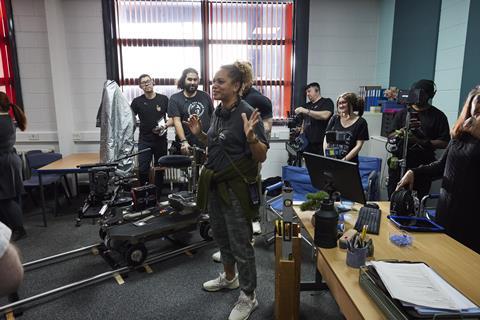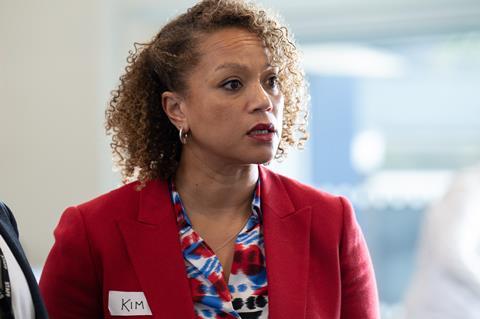Waterloo Road’s Angela Griffin on how she realised her ambitions to direct after three decades in front of the camera
I remember when the idea of being a director first entered my head: I was shooting Holby City at BBC Elstree and heard that Sue Tully, Michelle Fowler from ‘Enders had just completed a director’s course. An actress had become a director? I’d never heard of that before. Jim Goddard was directing Holby at the time, and I asked if he thought they’d let me on the course.
He replied saying that I didn’t need to do it – that I would know pretty much everything they’d be teaching. Instead, he gave me some handwritten notes for a book he was yet to publish which would explain some things I may not know. I still have them.
It took twenty-four years and a global pandemic to give me my first directing credit. Whilst self-shooting online drama Dunbreedin (written by Julie Graham) during lockdown under the guidance of director Robin Shepard, Robin called and asked if I wanted to direct the final episode. She could tell from my rushes that I had a director’s eye.

I jumped at the chance and felt boosted by Robin’s observations. Lockdown meant I had to write camera plans and shot lists for the actors then remotely edit; a part of the job that I had never been privy to before. I loved it, I wanted more.
When Cameron Roach approached me the following year about performing in the upcoming revival of Waterloo Road I asked if I would be able to direct as well as appear as the new headteacher. Although impressed by my confidence he politely said it wouldn’t be possible…. yet. Two series later, when negotiations came up for the third run of the revival (series 13) I was firmer with my request. He agreed.
Directing my first block of two, one-hour BBC1 episodes was revelatory for me. I expected to be terrified, to feel out of my depth, to not know a lot of things and to need a lot of help. What I discovered was its one of the most natural things in the world to me.
I felt completely at home. I had answers to every question, a solution to every problem – and I love the problems. I love the technical side, the framing, the lenses, the stops. I had inadvertently picked up so much over my 32-year career as an actor.
And working with the actors was so satisfying, plotting stories and journeys, and having thoughts that become notes, watching that thought manifest itself in the performance.
My character Kim Campbell appeared in both episodes I was directing which meant blocking and rehearsing myself, then having a double to line up on. I would then shoot the scene, only watching the last take once technicals were happy, and I felt happy with performance. I’d watch all the rushes once home the following evening.
The edit was unchartered territory for me, and I loved adding the layers and crafting what we’d shot. I think every actor should see behind the curtain – I think it’s made me a better actor.
I don’t want to stop acting, far from it. I’m probably more ambitious now than ever. Maybe because my confidence has grown and I’ve realised that I should be here, that I’ve worked hard to get here, and I do know what I’m doing.

Why did I not start earlier? Because I didn’t think it was a world that I belonged in. Directing has been a very male, very white, landscape for a long time. I’m black, I’m a woman, I’m northern and I’m working class. It took a long time to feel that I belonged in front of the camera never mind behind.
Ropeladder Fiction, Cameron and Lindsay Williams gave me a space where I felt supported and able to try, and potentially fail, and I will be forever grateful for the opportunity. I didn’t fail though, I grew, and I think I flourished.
I was offered another block, the finale episodes of series 14, which are airing shortly and a one-off episode filmed completely on location which I’m currently editing.
Less than 8% of people in the industry are from a working-class background, there’s still not a 50/50 gender split for drama directors, and I haven’t even dared to look at diversity figures.
I think my background influenced how I thought of myself and where I fit into the industry. Directors didn’ t look or sound like me, and they certainly didn’ t come from a council estate in South Leeds. I didn’t see it, so I didn’ t believe I could be it.
Visible representation matters and a variety of voices, thoughts and ideas from different worlds make for a rich and interesting landscape.






























No comments yet